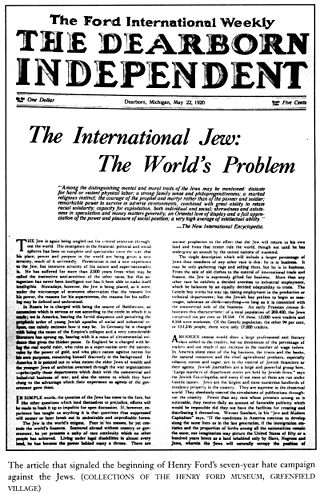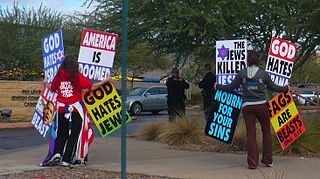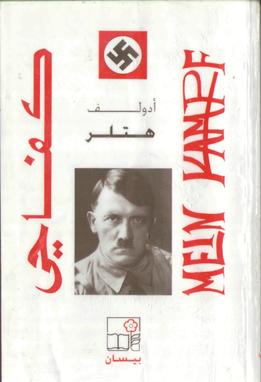
Benjamin R. Epstein was national director of the Anti-Defamation League from 1948 through 1978. [1] He was ADL vice president from 1978 through 1983. [1]

Benjamin R. Epstein was national director of the Anti-Defamation League from 1948 through 1978. [1] He was ADL vice president from 1978 through 1983. [1]

Epstein taught at the University of Pennsylvania and as a high school teacher in Coatesville for several years. [2]
Epstein joined the ADL in 1939 as directory of its Foreign Languages Department. [1] Epstein later became the Eastern regional director. [2] Epstein was national director of the Anti-Defamation League from 1948 through 1978. [1] He was ADL vice president from 1978 through 1983. [1]
Epstein replaced Richard Gutstadt, the national director from 1931 to 1948, [3] part of a broader generational shift in which Gustadt's crowd of German, Jewish particularist gradualists gave way to Epstein's younger cohort of eastern European, universalist, activist leaders. [4] In assuming leadership, Epstein changed tactics to favor aggression in pursuit of fighting antisemitism and Nazism in the United States. Whereas Gustadt avoided media and employed fact-finding campaigns to better understand Nazi groups, Epstein conducted public and oppositional media campaigns against antisemites and led infiltration of Nazi groups. For instance, Epstein's colleague and ADL attorney Arnold Forster developed a relationship with gossip columnist Walter Winchell, whom Forster fed embarrassing tidbits regarding antisemites. Prior to Gustadt's death in 1946, this contributed to tensions between the new and former ADL leaders. [5]
In 1939, the ADL was informed of someone in Chicago, Illinois translating an edition of Adolf Hitler's Mein Kampf . Epstein went to investigate, and he learned that then-journalist, future senator Alan Cranston had commissioned the translation. Cranston had been shocked that the available English translations of Mein Kampf left out the worst of Hitler's antisemitism and militancy. To fix this, Cranston wished to publish a translation highlighting the alarming aspects of Hitler's work. Epstein and Cranston co-founded Noram Publishing to publish the 32-page tabloid edition of Mein Kampf in 1939. [6] [7]
In 1960, Epstein discussed Catholic-Jewish relations with Pope John XXIII. He met with Pope Paul VI in 1971 and 1976. [2]
Epstein marched alongside Martin Luther King at Selma, Alabama. [1]
Epstein was born into a Jewish family in Brooklyn and was raised in Coatesville, Pennsylvania. He attended Dickinson College in Pennsylvania as an undergraduate, followed by the University of Pennsylvania for a master's degree. He received an honorary Doctor of Human Letters degree from Dickinson College and an honorary Doctor of Laws from Talladega College in Alabama. [1] In 1934, Epstein did a history fellowship with the University of Berlin in Germany. This brush with Nazism influenced his later anti-prejudice and anti-discrimination work. [2] [ how? ]
At time of his death in 1983, Epstein was survived by his wife Ethel, his children David and Ellen, and five grandchildren. [2]
Antisemitism is hostility to, prejudice towards, or discrimination against Jews. This sentiment is a form of racism, and a person who harbours it is called an antisemite. Though antisemitism is overwhelmingly perpetrated by non-Jews, it may occasionally be perpetrated by Jews in a phenomenon known as auto-antisemitism. Primarily, antisemitic tendencies may be motivated by negative sentiment towards Jews as a people or by negative sentiment towards Jews with regard to Judaism. In the former case, usually presented as racial antisemitism, a person's hostility is driven by the belief that Jews constitute a distinct race with inherent traits or characteristics that are repulsive or inferior to the preferred traits or characteristics within that person's society. In the latter case, known as religious antisemitism, a person's hostility is driven by their religion's perception of Jews and Judaism, typically encompassing doctrines of supersession that expect or demand Jews to turn away from Judaism and submit to the religion presenting itself as Judaism's successor faith—this is a common theme within the other Abrahamic religions. The development of racial and religious antisemitism has historically been encouraged by anti-Judaism, though the concept itself is distinct from antisemitism.

Mein Kampf is a 1925 autobiographical manifesto by Nazi Party leader Adolf Hitler. The work describes the process by which Hitler became antisemitic and outlines his political ideology and future plans for Germany. Volume 1 of Mein Kampf was published in 1925 and Volume 2 in 1926. The book was edited first by Emil Maurice, then by Hitler's deputy Rudolf Hess.

The Dearborn Independent, also known as The Ford International Weekly, was a weekly newspaper established in 1901, and published by Henry Ford from 1919 through 1927. The paper reached a circulation of 900,000 by 1925, second only to the New York Daily News, largely due to a quota system for promotion imposed on Ford dealers. Lawsuits regarding antisemitic material published in the paper caused Ford to close it, and the last issue was published in December 1927. The publication's title was derived from the Detroit suburb of Dearborn, Michigan.
New antisemitism is the concept that a new form of antisemitism which developed in the late 20th and early 21st centuries, tends to manifest itself as anti-Zionism and criticism of the Israeli government. The concept is included in some definitions of antisemitism, such as the working definition of antisemitism and the 3D test of antisemitism. The concept dates to the early 1970s, although the identification of anti-Zionism with antisemitism has "long been de rigueur in Jewish communal and broader pro-Israel circles".

The political views of Adolf Hitler, dictator of Germany from 1933 to 1945, have presented historians and biographers with some difficulty. His writings and methods were often adapted to need and circumstance, although there were some steady themes, including antisemitism, anti-communism, anti-parliamentarianism, German Lebensraum, belief in the superiority of an "Aryan race" and an extreme form of German nationalism. Hitler personally claimed he was fighting against "Jewish Marxism".

Saul Friedländer is a Czech-Jewish-born historian and a professor emeritus of history at UCLA.

Racial antisemitism is prejudice against Jews based on a belief or assertion that Jews constitute a distinct race that has inherent traits or characteristics that appear in some way abhorrent or inherently inferior or otherwise different from the traits or characteristics of the rest of a society. The abhorrence may find expression in the form of discrimination, stereotypes or caricatures. Racial antisemitism may present Jews, as a group, as a threat in some way to the values or safety of a society. Racial antisemitism can seem deeper-rooted than religious antisemitism, because for religious antisemites conversion of Jews remains an option and once converted the "Jew" is gone. In the context of racial antisemitism Jews cannot get rid of their Jewishness.
Jewish Bolshevism, also Judeo–Bolshevism, is an antisemitic conspiracy theory that claims that the Russian Revolution of 1917 was a Jewish plot and that Jews controlled the Soviet Union and international communist movements, often in furtherance of a plan to destroy Western civilization. It was one of the main Nazi beliefs that served as an ideological justification for the German invasion of the Soviet Union and the Holocaust.

Antisemitism has existed for centuries in the United States. Most Jewish community relations agencies in the United States draw distinctions between antisemitism, which is measured in terms of attitudes and behaviors, and the security and status of American Jews, which are both measured by the occurrence of specific incidents. FBI data shows that in every year since 1991, Jews were the most frequent victims of religiously motivated hate crimes, according to a report which was published by the Anti-Defamation League in 2019. Evidence suggests that the true number of hate crimes against Jews is underreported, as is the case for many other targeted groups. In an attempt to combat anti-Semitism, the Biden administration launched the United States’ first-ever comprehensive U.S. National Strategy to Counter Antisemitism on May 25, 2023.

The Protocols of the Elders of Zion, or The Protocols of the Meetings of the Learned Elders of Zion, is a fabricated text purporting to detail a Jewish plot for global domination. Largely plagiarized from several earlier sources, it was first published in Imperial Russia in 1903, translated into multiple languages, and disseminated internationally in the early part of the 20th century. It played a key part in popularizing belief in an international Jewish conspiracy.

The Anti-Defamation League (ADL), formerly known as the Anti-Defamation League of B'nai B'rith, is a New York-based international Jewish non-governmental organization and advocacy group that specializes in civil rights law and combatting antisemitism and extremism.

Imperium: The Philosophy of History and Politics is a 1948 book by Francis Parker Yockey, using the pen name Ulick Varange, that argues for a pan-European fascist empire. Imperium presents an antisemitic theory of history, asserts that the Holocaust was a hoax, and is dedicated to "the hero of the Second World War", meant to describe Adolf Hitler.

Mein Kampf, Adolf Hitler's 900-page autobiography outlining his political views, has been translated into Arabic a number of times since the early 1930s.
Since World War II, antisemitic prejudice in Italy has seldom taken on aggressive forms.
Antisemitism in contemporary Hungary principally takes the form of negative stereotypes relating to Jews, although historically it manifested itself more violently. Studies show antisemitism has become more prevalent since the fall of Communism, particularly among the younger generations. Surveys performed from 2009 and beyond have consistently found high levels of antisemitic feelings amongst the general population.
Evidence for the presence of Jewish communities in the geographical area today covered by Austria can be traced back to the 12th century. In 1848 Jews were granted civil rights and the right to establish an autonomous religious community, but full citizenship rights were given only in 1867. In an atmosphere of economic, religious and social freedom, the Jewish population grew from 6,000 in 1860 to almost 185,000 in 1938. In March 1938, Austria was annexed by Nazi Germany and thousands of Austrians and Austrian Jews who opposed Nazi rule were sent to concentration camps. Of the 65,000 Viennese Jews deported to concentration camps, only about 2,000 survived, while around 800 survived World War II in hiding.

Zionism in the Age of the Dictators is a 1983 work by the American free-lance journalist, outspoken pro-Palestinian activist, Trotskyist and Jewish author Lenni Brenner. The book makes the argument that Zionist leaders collaborated with fascism, particularly in Nazi Germany, in order to build up a Jewish presence in Palestine.
Since the early 1930s, the history of Adolf Hitler's Mein Kampf in English has been complicated and has been the occasion for controversy. Four full translations were completed before 1945, as well as a number of extracts in newspapers, pamphlets, government documents and unpublished typescripts. Not all of these had official approval from Hitler's publishers, Eher Verlag.
Arnold Forster (1912–2010) was a prominent Anti-Defamation League attorney.
Zionist antisemitism is the phenomenon in which individuals, groups, or governments support the Zionist movement and the State of Israel while simultaneously holding antisemitic views about Jews. In some cases, Zionism may be promoted for explicitly antisemitic reasons. The prevalence of antisemitism has been widely noted within the Christian Zionist movement, whose adherents may hold antisemitic beliefs about Jews while also supporting Zionism for eschatological reasons. Antisemitic right-wing nationalists, particularly in Europe and the United States, sometimes support the Zionist movement because they wish for Jews to be expelled, or for Jews to emigrate to Israel, or because they view Israel as a supremacist ethno-state to be admired and held up as a model for their own countries.